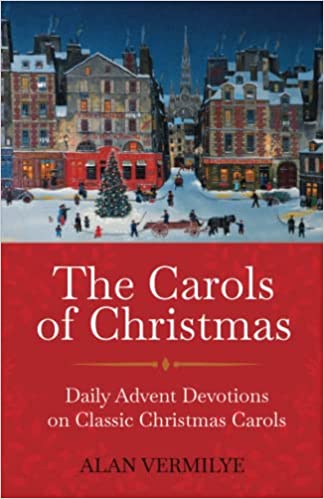This Tuesday is our annual study group Christmas party. There will be no lesson, only Amy’s Christmas games. Tuesday will simply be a time for us to gather and fellowship together. Please bring your favorite hors d’oeuvres or dessert to share (there is no dinner). Also please bring a wrapped $10-ish gift for the gift exchange. Finally, please bring a friend with you. Everyone is invited even if you are not a regular on Tuesday nights. The festivities will start around 6 pm.
Although we are not having a lesson this week, I hope that you have continued reading through Alan Vermilye’s book The Carols of Christmas. This week in the book is Charles Wesley’s great Christmas hymn Hark! The Herald Angels Sing.
Charles Wesley:
Until 1820, the Church of England only permitted the singing of metrical psalms and Biblical hymns, such as the Magnificant, that are found in the canticles of the Daily Office. In 1644, the English Parliament under Oliver Cromwell decreed the destruction of all organs, and most of the singing thereafter was without accompaniment. This is the Church where Charles Wesley (1707-1788) lived.
Charles (and his brother John) were graduated from Oxford University, where they founded the Methodist movement. Both were ordained clergy in the Church of England, and their movement was an attempt to renew the Church. On January 25, 1736, John and Charles were on a ship from England to Georgia that encountered a great storm. While others panicked, the Wesleys found the Moravians singing hymns. Upon the brothers’ return to England, they attended a Moravian meeting house where hymn singing was common, and there they experienced their hearts being “strangely warmed.” Wesley, still a priest in the Church of England, would publish over 6,000 hymns based upon those hymns he heard from the Moravians.
One of the hymns that Charles wrote was a “Hymn for Christmas Day.” The first line of the hymn was “Hark! How all the welkin rings, Glory to the King of Kings.” Welkin is a middle English word meaning the “vault of heaven.” This is where the angels dwelt, and so Wesley did write of angelic voices but simply used an archaic term. Wesley set his work to the majestic and stately tune he used for his Hymn for Easter Day (Christ the Lord is Risen Today). Try to sing the carol to this tune.
George Whitfield:
George Whitefield (1714-1770) was a younger contemporary of the Wesley brothers and became the leader of the Methodist movement in England when the Wesleys ventured to Georgia. Wesley did not mind his hymns being published or used by anyone else, except his rule was that his original words should not be changed. Changing the words could change the theology (and Wesley and Whitfield had some significant differences in their theology). Whitfield, however, sometimes did not follow Wesley’s rules, and he made several changes to the Hymn for Christmas Day. Most notably, Whitfield changed the opening line to “Hark! The herald angels sing, Glory to the newborn King.” Apparently, Whitfield was not as enamored with archaic language as was Wesley. The tune, however, remained unchanged.
William Cummings:
William Cummings (1831-1915) was the organist at Waltham Abbey Church, located just north of London. Cummings loved the hymn but wished for a more upbeat tempo. He was a great admirer of Felix Mendelssohn (1809-1847). In 1840, Mendelssohn had written a cantata called the Festgesang which commemorated the invention of the printing press 400 years earlier. Although Mendelssohn was a Christian (he converted from Judaism), he believed this tune to be too “soldier-like” to be sung with sacred words and prohibited its use for this purpose. Like Whitfield’s ignoring Wesley’s instructions concerning words, so Cummings ignored Mendelssohn’s directions concerning music. Therefore, for Christmas 1856, Cummings put Wesley’s words (as amended by Whitfield) to Mendelssohn’s tune, thus giving us the Christmas carol that we sing today. But since Cummings wrote neither the words nor the tune, his contribution to our Christmas hymnody is generally unknown.
The Christmas party begins around 6 pm. Everyone is invited!
Hark! the herald angels sing,
“Glory to the newborn King:
peace on earth, and mercy mild,
God and sinners reconciled!”
Joyful, all ye nations, rise,
join the triumph of the skies;
with th’angelic hosts proclaim,
“Christ is born in Bethlehem!”
Hark! the herald angels sing,
“Glory to the newborn King”
Christ, by highest heaven adored,
Christ, the everlasting Lord,
late in time behold him come,
offspring of the Virgin’s womb:
veiled in flesh the Godhead see;
hail th’incarnate Deity,
pleased with us in flesh to dwell,
Jesus, our Immanuel.
Hark! the herald angels sing,
“Glory to the newborn King”
Hail the heaven-born Prince of Peace!
Hail the Sun of Righteousness!
Light and life to all he brings,
risen with healing in his wings.
Mild he lays his glory by,
born that we no more may die,
born to raise us from the earth,
born to give us second birth.
Hark! the herald angels sing,
“Glory to the newborn King”

